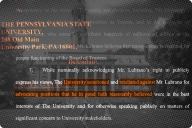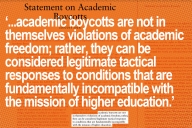You have /5 articles left.
Sign up for a free account or log in.

The University of Illinois at Urbana-Champaign and the University of California, among other institutions, are discussing when academic units should weigh in publicly on controversial external issues.
erhui1979/iStock/Getty Images Plus
The University of Illinois at Urbana-Champaign’s Academic Senate approved guidelines for departmental statements on political subjects earlier this month.
The guidance doesn’t—and, as mere advice, can’t—ban statements about social or political issues. But it doesn’t endorse such statements, either.
“Departments as such should avoid statements on what we call here ‘external’ matters (state, national, or international policy matters),” the guidelines say. Any such declarations, where deemed necessary, should instead be signed by specific professors. Those in the department with dissenting views should be able to express them in the same forum, the guidance also says.
The guidelines are friendlier to departmental utterances about internal matters, namely the unit’s core academic research, teaching and university policy.
Nicholas Burbules, chair of the UIUC Senate’s General University Policy Committee, which drafted the guidance, said, “Staying content-neutral, we wanted to alert people to the dangers of certain kinds of highly controversial and divisive departmental statements—and to what we think would be better ways of putting out statements that respect the almost absolute right of faculty to formulate and express judgments and opinions themselves, as individuals or groups of individuals.”
A “group of faculty,” added Burbules, Edward William and Jane Marr Gutgsell Professor of Education Policy, Organization and Leadership, “is not the same thing as a department. And that was the distinction that really kind of started us off down this road.” (Burbules has contributed opinion pieces to Inside Higher Ed.)
UIUC isn’t the only institution to explore how and when departments should make political statements. Brown University in May adopted a policy saying that academic unit–level statements should be reviewed by a dean, to ensure that the message is accurate, evidence-based, action-oriented and “speaks to the implications of the external issue/precipitating event for the education, research, initiatives or operations specific to the academic unit and/or its field of study.” An “appropriate process” also must be followed, so that the message is “representative of the members of that academic unit.”
Per existing Brown policies, statements about electoral politics are generally not permitted. Defamatory, discriminatory and threatening statements are likewise prohibited.
The University of California system’s Academic Senate issued its own guidance in May.
Jacqueline Pfeffer Merrill, director of the Bipartisan Policy Center’s Free Expression Project, said these discussions come at a time of “increasing pressure on colleges and universities, as well as departments, to make speeches or issue statements on social and political issues of the day. And that’s why it’s important for institutions—as wholes and departments—to have plans and processes about whether, on what occasion and why a statement would be issued.”
UIUC’s guidelines are designed to apply to potential statements about any topic. But Burbules’s committee’s work was prompted, in part, by faculty disagreements about statements on the Israeli-Palestinian conflict, including a 2021 statement of solidarity with the Palestinian Feminist Collective, which was adopted by UIUC’s women’s and gender studies department and other gender studies departments elsewhere.
The university says it’s reviewing the Senate’s work, but the document remains advisory. Supporters nevertheless hope that the guidance will help inform departmental decisions about making political statements and better protect the academic freedom of individual professors and others who may not agree with their colleagues’ positions.
Departments vs. Individuals
“A departmental statement risks silencing or misrepresenting the voices of faculty holding a minority view, as well as staff and students who are members of the department but who may not have had an opportunity to express their views on the statement,” the UIUC guidelines say. “A department is not a voluntary association, and a department, as such, exists apart from the particular individuals who occupy it at any point in time: their opinions on external matters are not the department’s opinion.”
The UIUC Senate guidelines include five major recommendations, beyond the ultimate counsel against broad departmental statements on external matters:
- Academic unit bylaws should detail a clear process, based on shared governance principles, for issuing any statement expressing the position of that unit.
- Any faculty members who believe a departmental statement violates their academic freedom can appeal to standing faculty committees.
- To avoid giving a “false impression of unanimity, in many cases (especially on highly contentious and controversial issues),” it’s better to issue a statement signed by specific signatories and to include any dissenting views.
- To “prevent any misunderstanding,” statements should include a disclaimer that the unit doesn’t represent the university as a whole.
- As specific academic units don’t own their websites, departments “should not post on their website, or disseminate through university-affiliated departmental social media sites, statements that are not directly tied to the unit’s core academic research and teaching activities or addressing matters of university policy.”
UIUC’s Senate approved the policy committee’s work 76 to 19, with 22 abstentions. The vote followed some debate, including comments from David Forsyth, chair of the Senate’s Committee on Academic Freedom and Tenure, which previously reviewed the policy recommendations. The biggest difference between the two committees’ takes on the issue was that Forsyth’s said following pre-existing university policies on academic freedom necessitated involving the chancellor. While the chancellor has zero power to prevent departments from making political statements, Forsyth’s committee argued, the chancellor does have the power to “withdraw and disclaim departmental statements,” when appropriate.
Forsyth told Inside Higher Ed that departments are administrative units that for this reason don’t have academic freedom, “So the chancellor is involved and should be robustly criticized if the chancellor does not cause departments that do make statements that impinge academic freedom to withdraw them.”
A majority of senators agreed with Burbules’s committee’s stance against involving the chancellor and attempting to resolve academic freedom disputes among the faculty, however.
“We have committees on this campus,” Burbules said, “who hear appeals by faculty who feel that their academic freedom has been infringed in some way. So our view was, if you are a member of a department that issues a statement that you feel violated your academic freedom, go to these committees and follow the due process of these committees.”
Robin Kaler, university spokesperson, said in a statement, “We are committed to academic freedom and are reviewing the guidelines in the Academic Senate resolution.”
Taking a Stand, or Not
Pfeffer Merrill, of the Bipartisan Policy Center, said it’s “of course the case that institutions should always be able to speak about social and political issues that have a direct impact on your operation.” To this point, Pfeffer Merrill said, even the University of Chicago—whose commitment to institutional neutrality dates back to a 1967 report by a group called the Kalven Committee—has weighed in on such issues as the Deferred Action for Childhood Arrivals immigration program, which affects some students. Simultaneously, Pfeffer Merrill continued, “it’s always the case that institutional or departmental speech risks chilling the speech of others who disagree with what’s being said. And that pressure is especially intense at the departmental or academic unit level, where it’s more easy to identify individuals who are in that department or academic unit.”
The risk, she added, “is a faculty member or student or staff member may feel that something is being said that he or she disagrees with and thinks that there may now be risks for speaking out with a different point of view—at a time at when the very mission of higher education is to be able to have conversations that are open and frank about contentious academic as well as social-political issues.”
On the question of institutional-level messaging, in particular, a 2021 report on campus free expression from the Bipartisan Policy Center says that “on our task force, members hold varying opinions about the range of issues appropriate for an institutional position. While universities will reach different conclusions, we think it is important for university leaders to anticipate what would fall within the range appropriate for their school. University forums, speakers, panels, and campus events that bring multiple viewpoints on contentious issues demonstrate seriousness of purpose in the university’s civic mission and alertness to contemporary social and political concerns even without the university taking an official stance.”
A protocol for presidential messages at DePauw University—whose president, Lori S. White, sat on the center’s task force—warns, for example, that “overuse” of the president’s voice may lead to the “expectation that the president should personally respond to a broad range of issues or national and world events, even those that do not directly affect the DePauw community. Such frequent presidential messaging may undermine the regard and importance of a president’s message in times when it is especially needed and warranted and create an expectation that the president ‘should’ respond to every situation, thereby de-emphasizing the importance of other voices in the community.”
The University of California’s Academic Council, part of the system’s Academic Senate, also approved new recommendations for departmental statements in May. Drafted by the University Committee on Academic Freedom, these recommendations say that:
- Departments should develop clear but flexible standards for developing and issuing statements on controversial topics.
- Departments “should be transparent about who is included when the department speaks as a department” and whenever possible vote anonymously to “minimize chilling effect or pressure on members of the department with minority views.”
- All statements on controversial matters should explain the position taken and who is taking it.
- Departments ideally should consult with their campus Committee on Academic Freedom prior to publishing a departmental statement on a controversial issue.
Brian Soucek, professor of law and Chancellor’s Fellow at UC Davis, and former chair of the systemwide academic freedom committee, said the points are “guidance, not regulations or mandates. The gist is that departments should develop procedures for how statements on controversial issues get made. They need to think about—and make clear in the statement—who those statements are speaking for. And they should include a disclaimer making clear that they are not speaking on behalf of the University of California.”
While the UC Senate recommendations apply to all system campuses, select UC institutions have initiated their own inquiries into the issue of departmental statements on external matters. One at Berkeley has proven controversial, with the Berkeley Faculty Association disagreeing with a draft faculty-administrative report that was informed by the systemwide academic freedom committee’s preliminary recommendations. In a written response to the joint report draft, the Berkeley Faculty Association said the guidance “pedals a corporate view of the university in which all ‘stakeholders’ are held responsible for not causing ‘reputational damage’ that tarnishes the UC Berkeley brand.” It’s “hard not to read the report as a timid response to the alt-right targeting of universities in the culture wars and an effort not to alienate potential donors.”
‘No Easy Answers’
Berkeley’s joint report draft says, in part, that “Departmental statements on controversial issues should be made sparingly and with great thought and care about their possible effects—including harm and hurt to members of the university community and reputational damage to the university.”
Calling for clear processes on how and when departments issue statements, the draft report says that if a unit permits the publication of statements that don’t reflect the views of the full unit department, statements “should be signed by the members of the department who endorse them.”
James Vernon, Helen Fawcett Distinguished Professor of History and chair of the Berkeley Faculty Association, said this week that “our main issue is with the idea that political statements have to conform to these principles of civility and—what they call in campus-speak—the principles of community.”
Vernon continued, “This discourse of civility and community is a way of trying to limit free speech on campus. Whoever said the free speech was gonna be simple, or that it wouldn’t offend people within our community? I mean, it’s a contradiction in terms.”
MaryAnn Smart, Gladyce Arata Terrill Professor of Music and chair of Berkeley’s division of the Academic Senate (which is a different body than the Berkeley Faculty Association) said that the report working group has since August been collecting feedback via meetings and surveys. A final report is due in late January.
Michelle Deutchman, executive director of the UC National Center for Free Speech and Civic Engagement, at Irvine, said these are “complicated issues that touch on people’s deeply held beliefs about the mission and role of higher education, and there are no easy answers. But having the conversation is a first step.”
Deutchman said it’s “valuable for universities to think through issues that arise when the institution speaks, whether that expression is coming from the president’s office, from the dean of a specific school or from an individual department.” Like all speech issues, she added, “the devil is in the details, and when discussing speech by academic units, you have to thread the needle through what is required by the First Amendment and by the norms of academic freedom.”
While some argue that departmental statements undermine academic freedom and suppress minority viewpoints, she said, if departments do decide to speak, definitions are “essential,” as words such as “political” and “controversial” can “mean different things to different people.”
Clarity about who is speaking “is also key,” Deutchman said. “For instance, who is included in the department—tenured faculty, all faculty, staff, graduate students? Anyone whose voice will be represented by a statement should have a role in deciding about what is or is not being said.”
Transparency, regarding the process for making decisions and disclaimers “clearly stating that the unit’s statement does not represent the campus or even every member of the department” also matters. Ideally, Deutchman said, “these governing protocols would be memorialized in writing and publicly available.”









